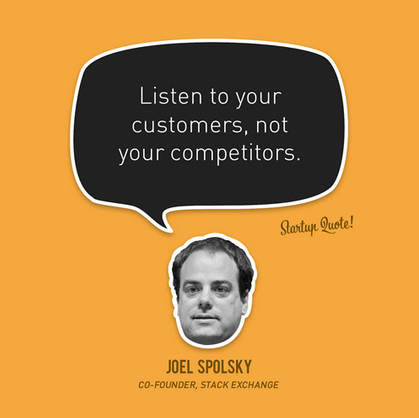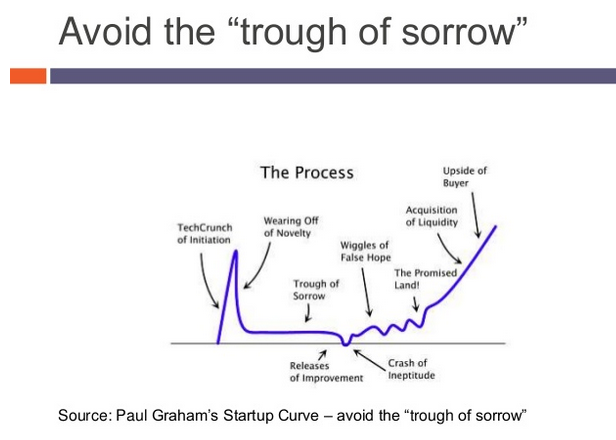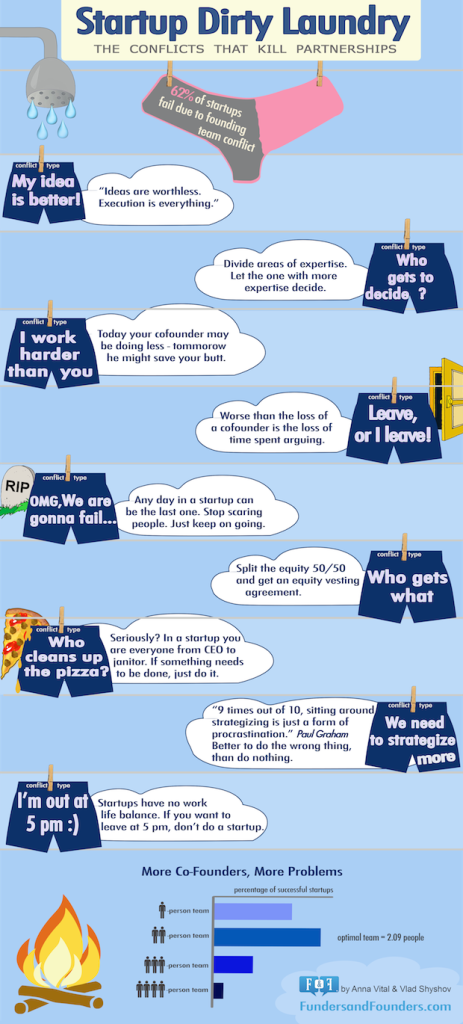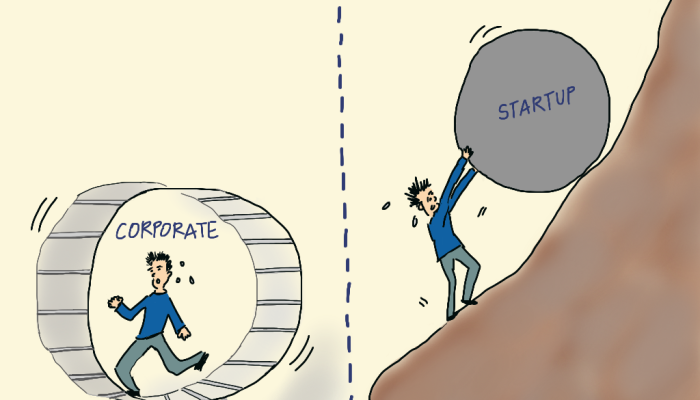Just as there are many successful startups out there, there are also thousands of failed startups from which we can take invaluable lessons on what to do, and what not to do in order to make your startup a successful one. Answering the questions of how to make a successful startup comes from the core reasons behind unsuccessful startup ventures. To be successful, you will need your share of luck. But success or failure can be attributed to a lot more factors than mere luck.
As long as you make something that users want and it actually solves a problem that is missing within market, then you have an increased chance of a successful startup.
“Solve Problems. Don’t build ideas”.
Most of the failures are centered towards the very fact that the startups failed to generate enough value for its customer base. Why? Without providing value, don’t expect to see financial remuneration for your product or service.
However, this isn’t the sole reason overall why startups fail. Paul Graham, Co-founder of YCombinator, published an article based on similar factors of why startups fail, but are the factors still the same? Do Paul’s factors stated relate to the current state of startups today? There are many factors which are considered to be attributed towards whether startups succeed or fail – here are our top 16 pivotal factors of the crucial points between a failed or successful startup.
1. Having a niche is crucial – and serve that niche better than anyone else
Even with the most successful startup companies you hear in your living rooms today, all started at the same point you are currently on or have passed. The most successfully developed startups cannot be sold to everyone in a large market. That’s why one of the first pieces of advice entrepreneurs should get is related to the importance of defining their target market and customer. This is going to help you achieve product/market fit which doesn’t come overnight, but defining your market and customer base, along with being patient, is crucial for your chances of achieving product/market fit quickly and on to focusing on scalability.
Finding the right niche is essential for the success of your startup. It determines the potential sales of your product, shapes the framework of your customer related strategies and defines the possibility to dominate your niche in the very near future.
How are you different?
To be the best, you will have to compete with the best. Most likely, you are choosing a niche which is being served by a business with a compelling value proposition. Trying to bypass this competition too quickly could well be counter productive – as you don’t focus on solving the problem at hand. Also, many startups then try to avoid competition and then opt for small and obscure niches that fail to attract customers. You should be embracing competition – that means there is proof – just don’t make your competition your sole focus (I’ve been guilty of this and it just simply doesn’t work).
So, what do you have to actually worry about? Creating a product that is awesome!
Christian Reber, Founder and CEO of 6Wunderkinder believes that, finding the right niche and staying focused with that niche specifically with majority of your resources, will be the decisive factor for any instant growth.
Execute, deliver, and then move on to serving other markets once you have dominated the original target niche.
2. Building a startup from an existing business model or startup
Building startups related to derivative ideas (meaning generating your startup idea from any existing service or application), can be very difficult to penetrate deep into the market and have long-term substance. If we look around, the most successful startups are those which were able to come up with authentic ideas to creating a revolution to a problem in their respective industries.
This doesn’t mean you should totally discount creating startups from an existing and successful business model. Coming up with modifications to existing solutions will help you a little to be a pioneer in your field. However, those that come up with a solution to unsolved problems, you can expect they will thrive in the related sector based on situation and market demand.
Visualise about the problems that you find within your industry/niche and think of its solution from your perspective. Mark Zuckerberg launched Facebook initially only for communication purposes in his college at Harvard. That small platform has turned out to be huge at present. It was kind of an accident, but in many ways it wasn’t – he controlled the right audience from the start. That’s what the growth team at Facebook implemented to reach over 500+ million users. But he did manage to come up with something innovative and minor existent in that time. That is the key.
3. Going Solo
It is not a coincidence that many successful startups have multiple founders. Starting a startup from scratch and establishing it to product/market fit, then scalability to a profitable level, requires hardship and inspiration. It is too challenging to face all the difficulties of a startup journey alone. If you do not have others to share your views and brainstorm on strategies and then actual execution, you will more often or not stay undecided whether your decision is the correct one.
(Image Source: Fortune)
Leo Laporte, the founder of the TWiT network and host of The Tech Guy and This Week in Tech, is a prime example of such a scenario where he believed he knew everything as a founder, only to find out that he did not know anything about making a viable business: finance, marketing, advertising, and human resources. Did he make it eventually, yes. So it can be done, but you have to exhaust your existing networks to make it happen.
Quick Suggestion
Having friends or close acquaintances (former work colleagues, etc.) whom believe in your startup dreams are great candidates to forming a startup together. Trust is key in running a startup. You are going to be sharing a lot together, so find someone who is going to go thick and thin to bring your startup dreams into reality.
If you’re serious about running or starting a startup by yourself, I suggest reading this article.
4. Not having a user in mind for your startup is… Ludacris
I think you have to be an ‘idiot‘ if you don’t have this mind when launching or running a startup. Well, the word ‘idiot’ is a bit strong, but if you don’t serve or keep a user in mind when building a startup, then you’re not ready to start a startup or rest assure, nearly guaranteed to fail. When you are planning to make something, you definitely need to plan to solve a problem with your product/service and that service will need to be directly related to solving a problem for your target segment of users. It is quite hard to come up with a viable solution to a problem if you do not know who will get the benefit using your service. Therefore, understanding your target users is extremely important.
Understanding your customer
Understanding your focus user is easier if you relate yourself to that group. Create a startup that solves a problem that you have been experiencing or have experienced. It’s possible to create a startup that isn’t a niche you associate yourself with, but you have to know that industry from back to front.
When you are building a business that will serve many customers, you will have to ‘constantly’ talk to them, collect data and always reiterate based on captured data in your disposal to cater for your first few customers – this is called customer validation.
Customer validation consists of four phases:
- Preparing to sell
- Selling to visionaries
- Determining your positioning
- Verifying your validation process
I highly recommend reading this e-book by Steve Blank and Bob Dorf.
Sandi MacPherson, the Editor-in-Chief of Quibb, pointed out the error of not understanding her market/users enough. She spent almost 6 months trying to build a product that she realised she wouldn’t even use herself. Test –> Measure –> and learning about your product/service, and providing an experience for your customers is pivotal.
5. Reluctance and tenacity to a one-goal purpose
We all have goals in reaching startup success – “I want to become the next Uber”. “I want to build a $100 Million business”. Holding on to one single goal is a fine and admirable psychological trait, and very important as it’s going to be a decisive factor that will help you push through the tough times of running a startup. However, such adherence to the end goal is not a good idea in case of startups. Why? Because nothing is certain in a startup. There is no clear path to startup glory and you need to plan short-term goals.
We see this with many startups that plan goals categorically. Startups fail to plan for market disruption. Environmental influences around you are dynamic, the list goes on with many reasons and it will happen to you – guaranteed. You can’t control what you can’t control. What you can control is your planning and strategy around catering towards these shifts with short-term goals. By the time you launch your product, you may well find that the market demand has changed. New variables emerge all the time. You have to learn to embrace that goals change in startup life, and they change quickly.
Once you have experienced running a startup, you quickly realise that the end goal is not what truly matters, but the journey of reaching the destination, that is truly special and life-defining.
In addition, have contingency plans and be open to changes. The changes will have to make sense and be beneficial for your startup. In Contrary, changing plans too often will hamper stability. Levi Cooperman, Co-founder and VP of Operations of Freshbooks suggests that do not get stuck planning too long. Plan while you can, launch as soon as possible, and make changes as you go.
6. Slowness In Launching Or Launching Too Fast
This factor deals with the two extremes of the time taken to launch a startup. It is very common among founders to procrastinate a launch. There are many reasons why – fear of being judged, not being perfect, not setting a definite goal, etc. It is very important to know that, slowness in launching can be more damaging than launching too fast.
So, what categorises the optimal time to launch a product? Fast or slow?
Well, it really does depend on your goal and mindset. If you are looking to launch a SaaS product, then you may decide to launch it in its beta version (with limited features) quickly, to see how the early adopters accept it. Judging the user experience in the initial stage, you can then build on catering to your customer’s need.
On the other hand, if you delay too much, trying to be a perfectionist (it happens to most startups), you might find it hard to catch your desired customers, as your competitors might have already run away with the show (although you can always get them back, but I do believe in first-mover advantage).
Robin, the Founder and CEO of Buzzcar and also the founder and former CEO of Zipcar, says that with their second company GoLoco, social online ridesharing, they spent too much time and effort preparing the software. In the process, they were unable to engage with the customers for feedback and relevant data to reiterate and refine for trying to achieve optimal customer satisfaction.
7. Not hiring the best tech talent – or, talent in general
Programmers are an integral part of any startup. Therefore, hiring good programmers is very important – but it is not deadly in the short term, but it will become a burden in the long term. In cases where startups are founded by programmers, it may not be a big deal if bad programmers are hired (although the probability is very small that the founder, being a programmer himself, will recruit the bad ones).
But, this porblem arises when business founders look to hire programmers. I’ve seen it happen many times. In such situations, bad programmers may get hired. The reality is, hiring any talent for a startup is hard to find. If you are a business person for your startup, or don’t have technical talent on your team, then you should look to take assistance from a skilled programmer who will help you find the right person for you. Consider them for an advisor role or a ‘ghost’ CTO. You may be able to outsource your projects to the point where you get funding – but again, you need strong advice on pursuing outsource of development work with detailed processes.
8. Not choosing the right tech platform for launch
This problem could be a byproduct of choosing bad programmers because they may only code in one language, or have strong opinions of where you should build your original startup with. The decision to use the best platform on which your startup application will be framed is very important, but not fatal. (Note – Platforms here means an operating system or programming language which will provide foundation for your startup – e.g. Web, Mobile – Apple/Android). If you are able to hire good programmers, then they should be able to choose and advise which is the right platform to work with for launch of your product and future growth. Paul Graham, Co-founder of YCombinator, says choosing the right platform is crucial for a startup’s success, but this article suggests otherwise. What are your thoughts on this? Is it that crucial?
(note: we know there are other platforms out there – we are just going mainstream for this picture)
9. Not raising enough money
At some point of time in your startup journey, you will need funding (or the very rare case like Envato – generating millions and completely bootstrapped). The funding may come from you or other founders or from investors. If your startup is not generating enough revenue, then you will find it hard to convince investors. They will not want to invest in a startup that does not promise to provide a sufficient return on investment.
How much money should I raise?
The simple answer is, “as much as you can”… but in some cases, more isn’t necessarily better. Although you should raise as much money as your company needs to achieve major proof-points/milestones, overfunding a company can also have its drawbacks (my next factor below).
To get the answer of how much to raise for your startup, you should set a specific goal in terms of growth. If you are looking for growth like wildfire, then the cost of producing this growth rate will burn cash very quickly – and this will need to be taken into consideration when raising funding. Michael Hyatt is the New York Times Best-selling author of Platform and also a serial entrepreneur. He encountered this problem when his company growth was beyond his control and the rapid growth consumed all the capital he raised. I mean, it sounds like a good problem to have right? But, growing too fast with not enough cash, can crash your company.
10. “Wow, congrats! Now, what are you going to do with all that money?”
Good question! It is quite evident how too little money can damage your startup. However, too much money takes its toll too. If you raise too much from investors, you will have to make sure that the money raised is used and put into overdrive. Before you even consider raising, you have to know exactly where you are going to spend the money for your startup’s growth. Here are a few reasons to take into account between what’s expected from founders and that expected by investors;
- With more money usually come more investment terms and more due diligence.
- A high implied post-money valuation. In order to accommodate a large round, investors need to adjust your valuation accordingly.
- A propensity to misuse ‘easy money’
- The media’s reaction (positive or negative) to how much money you’ve raised relative to what you have.
Money should not be kept idle. You will have the added pressure of using the money raised (without wasting it), and in the process, you will have reasonably strict KPI’s (or growth milestones), where you will have to prove that your idea is still viable for further funding down the future.
The larger amount you want to raise, the longer the process will take. Could you be focusing more time on your startup product or service offering? This is a question you should keep in mind.
11. Burning too much cash
I’ve briefly brought the issue of ‘burning cash’ up in the “Not raising enough money” factor. The other side of raising money is extravagant – the burn cash rate of some startups is significant. When this happens, you aren’t necessarily in trouble, but you are certainly in a more dire state and drastic change needs to occur quickly.
So, what may cause you to end up burning more cash that is required?
One primary reason behind excessive spending is the hiring of unnecessary and unproductive people. Sam Altman recently talked about how some Silicon Valley startups burn more than $1Million per month – incredible!
On the topic of hiring, hiring people who are not giving you the return you justify, can be a very big issue. It’s just like hiring bad programmers. So, one great way to avoid such expenses is to avoid hiring at all early-on (if possible). Consider outsourcing minimalistic/mundane tasks that need to be completed. Another option for this issue is to hire the people you would like, have serious talent and are passionate, where you can grant equity rather than salary – or a hybrid of both remuneration options. This topic in particular is another blog post for another day as it’s often a ‘touchy’ subject, but it is an option you should consider. Using this process, you will get more commitment from talent you want to hire because then, they have more skin in the game.
Another reason why startups fail because of burning cash, is leaving minimal cash supply for the ‘trough of sorrow’ (which many of you may face). This isn’t a scare tactic, it simply means you have to be prepared for the unexpected, and have enough finances in the backlog to cater for this phase and to help move back into the ‘growth’ phase → and then onto the ‘maturity’ phase. Read more about Paul Graham’s Startup Curve here.
12. Founder disputes (can’t we all just get along?)
This is a very common factor for many startups. After few years of the journey, one or two founders want to go a different direction – strong opinions start to unravel. It may not be a big deal if the person who decides to leave is not very committed, however, when someone with valuable skills and a member with the original vision of the startup leaves, then true problems arise.
Fights between founders are likely to arise when startups are founded by such people who do not really care about each other and do not share the same vision and mission as the other. So, you must not start your startup with someone who have technical skills but whom you do not like or know much. Collis and Cyan Ta’eed, Founders of Envato reiterates the point that, “If you have co-founders, make sure you document who owns what, how you’re going to pay yourselves, and who makes what decisions.”
This is a great graphic by the guys at Funders and Founders. Conflicts between founders can kill startups.
13. “I can’t be bothered” – Attitude for growing a startup
All startups require programmers who will code – they will go through challenges. All startups require marketing founders which are meant to expand the company – they will go through challenges. All startups require the Business founders to run the business – they will go through challenges. Simple. Founders need to get ‘nitty gritty” and get their hands dirty and execute their core skills in order to get the most out of their startup. Too many times, founders get bogged down when they get rejected or a big deal/partnership doesn’t work out for them. It’s reality. You have to keep pushing and not give up too easily to rejection. They may so ‘no’, 2, 5 and maybe even 10 times, but eventually, they will say yes.
Another reason founders need to push is because there are going to be plenty of times where the work is mundane and boring – even though you are doing something innovative and exciting. You still need to embrace processes. Processes are key for business functionality, or your business just won’t simply move forward.
You need to work on your business, not in your business.
There are many tasks for founders – there is so much to do. Enjoy the hard work. Besides, if you super passionate about your startup (which you should be), then half the time, it won’t feel like work.
14. Profit > Users = Death
Your ultimate goal should be to come up with a product that your target users will desperately need. As long as you can deliver a service that the users are satisfied with, you should not worry too much about profit. Profit will follow customer satisfaction. Value = profit! If you put profit maximization ahead of user experience, then you are heading towards the wrong direction. Putting customers first means customer loyalty – which means future and repeat revenue.
It also comes down to an attitude towards what you are trying to dow with your startup. Aiming for profit as your sole goal (or even in your top 3), you will lose focus on providing an experience for your customers, which is much more satisfying (trust me, I’ve fallen into this trap too).
You will see with any successful startup – they put their customers first, and emphasised this time and time again in the early stages, and now they are reaping the rewards.
15. The gamble with investors
If you take funding from investors, then they will be an integral part of your startup. But, how much importance should you give them in relation to your startup? Managing your investors has a fine line that lies between ignoring them or giving them the right to give you more control for startup success.
Giving investors too much control may cause misuse and redirection of the company against your will – which can be more damaging. You can only make them a part of the decision making process if, and only if, they have the same vision as you have for your startup.
It also comes down to the factors of how much money they have invested in exchange for equity – in the overall they play in decision-making processes.
Jesse Jacobs Founder, Samovar Tea Lounge emphasises the importance of finding the right investors who believe in your company’s mission. This can be hard, but with patience, it will pay off in the long run. Don’t focus on the financial remuneration, focus on the ‘effort’ the investor is will to give to live and breathe your startup to global scalability.
16. A startup isn’t just a business, it’s a lifestyle
Startups are a lifestyle. It isn’t a 9-5 job. It’s a 24 hour job. This doesn’t mean you are constantly working 24 hours of the day, 7 days a week. What it means is that you will never stop thinking about something related to your business. Trust me, it’s not an understatement (I know :).
There are many startups that have failed that we never hear about – we only hear about the really big failures. There have been many individuals who have started projects on the side and that have failed which we never hear about.
I’m a big believer you can create a side business outside of your normal daily job. It’s something I strongly recommend to potential entrepreneurs who want to take the leap of faith and go ‘hard core’ with taking their startup to the next level. Too many times however, they fail, because they underestimated the time and energy it does take to run a startup, particularly if you haven’t done enough research and planning, or even started to make revenue.
If you want to run a successful startup and want it to grow, then you will have to quit your day job. However, there is much more you can do on the side, to increase your chances of success.
Many entrepreneurs also don’t take into account some of the sacrifices involved in building a startup. It’s something to also take into account too.
A startup isn’t just a business, it’s a lifestyle, but a lifestyle with much more fulfilment and purpose. It’s also an incredible life experience, whether you succeed or fail – you can take my word for it 🙂
(Image Courtesy of entrepreneurialfail.com)
Hope you enjoyed this blog post 🙂



















